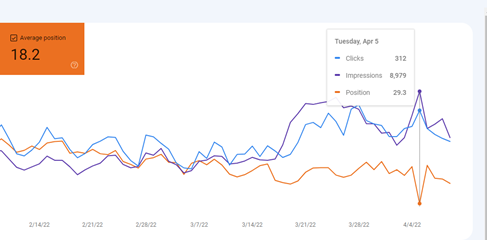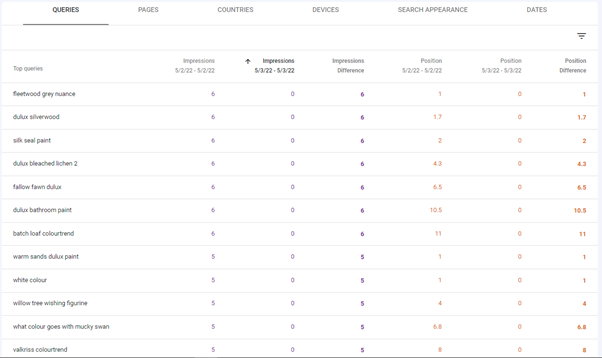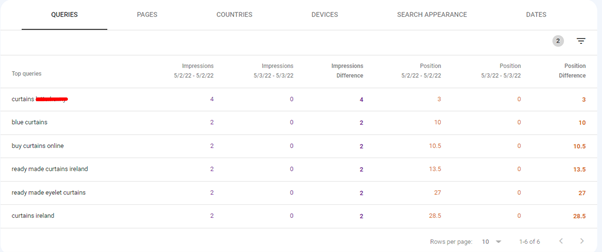Vampire Teeth in Google Search Console – Miss this, and it could suck all the rankings from your page.

Questions we will answer in this post :
What is “Vampire Teeth” in Google Search Console, and how do you spot it?
Why is it important to identify this “gift” from Google?
How to analyze “Vampire Teeth” for SEO benefit?
How to adjust the page content with the data on hand
So, what are Vampire Teeth and how to spot them?
Vampire Teeth is a name I use to describe a particular phenomenon in Google Search Console. It is not that common and sometimes difficult to spot, but it is extremely helpful to SEOs.
Any SEO that has ever ranked a page in the SERPs knows that impressions increase when rankings increase. It’s simple logic that’s been an in-field observation since the dawn of SEO.
Rank Better = Get more Impressions.
This also rings true when your rankings go the other way as well.
Rank Worse = Fewer Impressions
But what about when we see a sudden drop in the average rank of a page but impressions shooting up simultaneously?

This is what we call “Vampire Teeth“.
When two are close together, like in the following image, it’s also fairly easy to spot.

It’s when there’s only one that spotting this becomes a bit trickier.
What we are looking for is a sudden drop in the average rank with a sudden spike in impressions at the same time.
The timing is the key, when these two things happen at the same time, on the same day.

Why is it important to spot this, you ask?
Well, let’s look at what actually happens on this day.
We know that Google uses click data to confirm the relevancy of a page. Suppose Google gives impressions to a page in the SERPs, and searchers click on the result consistently. In that case, the click data confirm that the result is highly relevant to the search that was made.
And if the SERP result gets low to no clicks, then obviously, the page is less relevant to the search that was made.
Basic SEO 101.
From this simple observation, it’s safe to assume that the sudden increase in impressions and decrease in average rankings clearly indicate that Google is testing the page’s relevancy for a new set of phrases at a lower-ranking position.
Why is this significant?
Well, this proves that Google is not confident in what your page is about. Either current click data did not confirm what Google thought your page topic must be, or the page content itself is not “on-topic” enough for Google to make a clear decision on how to index and rank that page.
This should be seen as a gift from Google, and as SEOs, we know this doesn’t happen often.
How to analyze “Vampire Teeth” for SEO benefit?
We first need to determine what Google tested the page in question for. We want to see if Google tried the page for a set of common phrases or a group of random words.
To do this:
- Create a date comparison report within Google Search Console’s Performance report.
- Compare either the day before or after with the day the anomaly happened.
- Look at the queries tab and sort the Impressions column for the typical day from smallest to biggest.
- Identify all the queries with zero impressions on a typical day and with many impressions on the anomaly day are queries Google tested.

Random phrases indicate that Google has difficulty in understanding what the page topic is and really what the intent behind the page is. When this happens, a complete rework of that page should be considered.
You should:
- Make sure that the purpose of that page matches the searcher’s intent.
- Think about where you want your page to be positioned in the sales funnel and make sure the content reflects that.
- Keep to a single topic per page, and don’t try to stuff related keywords in there to try and rank for “all” the longtail terms.
When the phrases are common, meaning they are mostly related or even on the same topic, compare them with your target keywords. This will help you get an idea of what Google “thinks” your page could be about.
Use this analysis to identify words to either add or remove from your content. Yes, I said to remove it from your content.
Most of the time, when I come across Vampire Teeth in SEO, I find that Google is testing a page for non-related and off-topic search terms due to unrelated words and phrases on the page. Intent and poor grammar is also a common culprit.
How do we use this data to make positive adjustments to a page
The page we are using as an example is a page that shares information on the best curtain fabric to use when making curtains.
The page’s content starts by saying, “If your current curtains make you feel blue, then don’t buy ready-made eyelet curtains online. Rather make your own”. It then continues to share the best type of fabric to use when making these curtains.
We found that Google tested the page for these terms on four separate occasions over five weeks.

Remember that this page is not an affiliate page selling curtains, nor an e-commerce page selling ready-made curtains. The page is informational on curtain fabrics, yet Google tested it for sales-related terms. This is a classic example where I recommend removing words or phrases from a page.
When you find that Google is testing a page for terms closely related to your target terms, consider adding these words to your content. Do not just blindly stuff them onto the page. Use these to see if your page lacks some fundamental info. Try to restructure the page content to include them without compromising your content quality.
Google does not give us SEOs a gift like this every day, so use it to your advantage.
